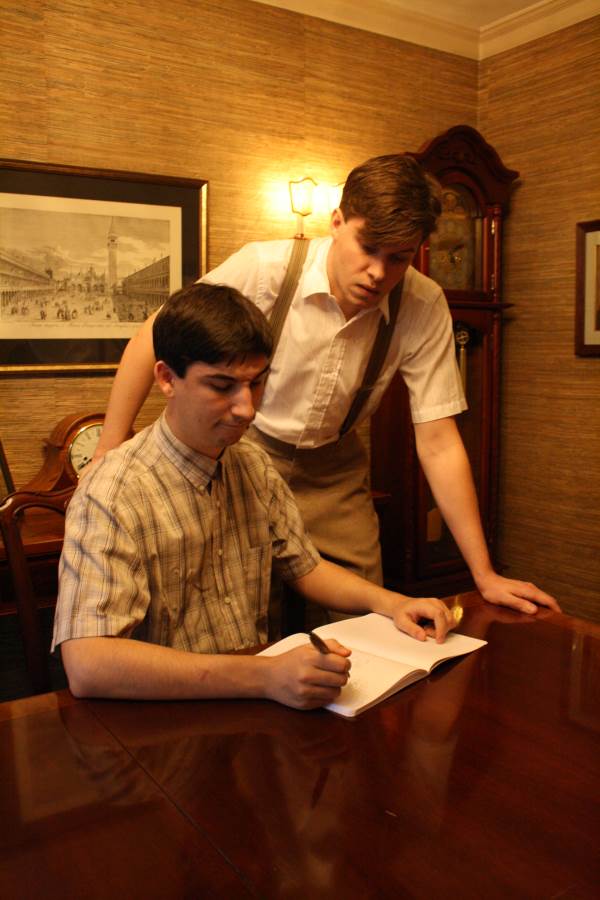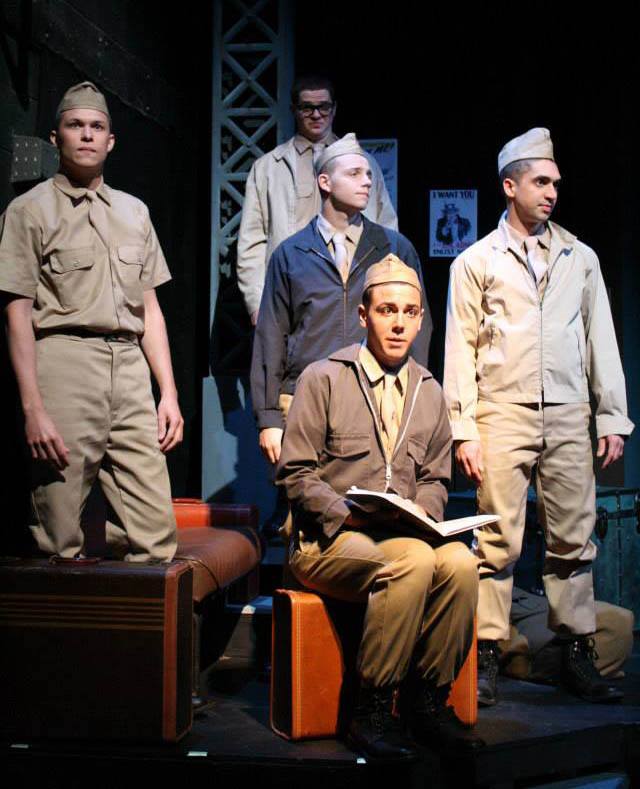 "Being in love can be a real career killer.”
"Being in love can be a real career killer.”
That's a classic quote from the beloved Eugene Morris Gerome, the protagonist of Broadway Bound, the final play in Neil Simon’s autobiographical trilogy, which opens this Friday, January 16 in The Market Space at 701 Whaley. University of South Carolina professor David Britt, who directed both previous installments for Workshop Theatre, returns to finish out the series.
USC senior Ryan Stevens steps into the lead role to complete the Eugene trifecta. “First and foremost, it’s a real honor to get to step in and be the culminating Eugene," says Stevens. "Jared Kemmerling, who played him in Brighton Beach Memoirs, really created a very youthful, energetic portrait of Eugene as a kid. Jay Fernandes, whom I’ve gotten the pleasure of working with personally, carried him through into young adulthood in Biloxi Blues. They both, in their respective shows, had to show Eugene growing up and adapting to different things - to the Depression, to the War, etc.,” Stevens says. "For me, in Broadway Bound, he’s older now - he’s starting his proper adult life. He’s got a chance here, a chance for efficacy. In the previous two plays, Eugene was really more observant, of family drama, of drama in his unit. With his career here, with the chance to become a writer, he’s getting an opportunity to actually do something for himself, for everyone to see.”
As a member of USC’s improv troupe Toast and a playwright himself, Stevens is no stranger to comedy and to the trials that a writer such as Eugene may face.
“I’m about his age, and as a senior here at USC, I’m about to be in a pretty similar career situation. I know how he feels, absolutely! When you’re writing, you want to believe what you’re writing in, and sometimes that carries over into a sort of syndrome where you just decide ‘This first draft? It’s flawless. Final draft. Done.’ Eugene’s brother, Stanley, in a lot of the scenes they share, is poking holes in the logic of what Eugene writes. Every critique he has is valid, but for Eugene, it’s infuriating! Any writer, in having their work reviewed, has that feeling of ‘Dammit, I know the logic is weak and this joke didn’t land and there’s a huge plot hole there, but I’ll be DAMNED if someone who isn’t me is going to tell me!’ I like to think that I, as Ryan, have gotten better at taking critique, but Eugene still bristles a little when he has to do the dreaded thing that haunts all writers’ dreams: edit,” Stevens elaborates.
Alongside all these comedic moments there is still a serious story to be told.
Simon is “very deft at handling all the clashing moods that happen inside this little house," Stevens explains. "David Britt has been great at reminding us that all of the humor comes from the same place as the drama, because it comes from us, the characters, the people and our relationships to one another. Neither humor nor drama really occur in a vacuum -- there has to be the human element to tether it, to make it feel real (and) relatable,”
While the story may be set in a decade different to our own, audiences today can still cherish the lessons learned through the eyes of a young writer similar to Stevens himself.
“Right now, these days, there’s all this talk about how this generation is the worst generation ever, that we’re lazy and entitled, and all this nonsense, which I really think is nonsense, because we didn’t do any of this! We didn’t create the world’s problems - the generation before us did, and we’re just the ones footing the bill. But by the same token, we’ll stand a much better chance of solving our problems and closing this hostile generation gap if we quit believing it ourselves. A lot of people my age have heard it so much that they’ve started believing it themselves,” Stevens says. "Broadway Bound is very clear in the fact that the previous generation of adults is always just as backwards and screwed up as the current one. It was true in the 1940’s, it’s true today, and it’ll be true in the future. There are always generation gaps. Broadway Bound wants the younger generation to realize that their parents are fallible, yes, and fallible because they’re people too. The age range in the play is at the point where the youngest character is 23, and therefore, nobody is a child anymore. Everyone is sort of on an equal playing field. Which is how it should be, for young and old. There’s no talking down in this play, there’s no pretension or condescension to anyone. The kids and the parents are on the same plane. Does that level of emotional honesty have some blowback? Of course. But it’s still better than acting like the people of yesterday, today, and tomorrow are too divided to communicate.”
Broadway Bound's cast includes Samantha Elkins and Lou Warth Boeschen, returning from 2013's production of Brighton Beach Memoirs, again playing Eugene's mother Kate and her sister Blanche respectively. William Cavitt,who appeared in Britt's 2014 production of Biloxi Blues in a different role, will portray older brother Stanley, while Chris Cook, last as seen as Lear opposite Cavitt's Edgar in this past fall's SC Shakespeare Company production of King Lear, plays father Jack. David Reed, who performed with Cook and Cavitt in the 2013 High Voltage production of Dracula, rounds out the cast as grandfather Ben. Reed in a way comes full circle with this performance, having played Jack in a 1990 incarnation of Broadway Bound at Town Theatre. The original Broadway production ran for over two years, and was nominated for four Tony Awards and four Drama Desk Awards, winning two of each, and was a 1987 Pulitzer finalist. The original cast included Jonathan Silverman, and Jason Alexander (who went on to star in The Single Guy and Seinfeld respectively) as Eugene and Stanley, with Linda Lavin (a Golden Globe winner for the long-running tv series Alice) as Kate.
Workshop Theatre's new production of Neil Simon's Broadway Bound will run January 16-25 at The Market Space at 701 Whaley. Tickets can be purchased through the Box Office at (803) 799-6551, or online at www.workshoptheatre.com .
~ Haley Sprankle











